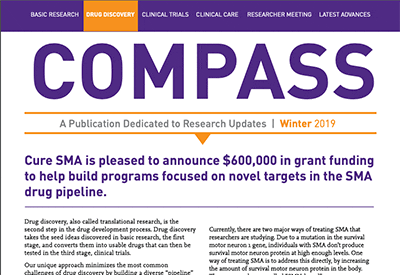

Scholar Rock, a clinical-stage biopharmaceutical company focused on the treatment of serious diseases in which protein growth factors play a fundamental role, today announced that the U.S. Food and Drug Administration (FDA) has granted Rare Pediatric Disease (RPD) designation for SRK-015 for the treatment of Spinal Muscular Atrophy (SMA), a progressive, rare genetic disease that leads to motor function impairments. Scholar Rock is on track to report 6-month interim efficacy and safety data from the ongoing TOPAZ Phase 2 clinical trial of SRK-015 in patients with Type 2 and Type 3 SMA in the fourth quarter of 2020. Top-line data for the 12-month treatment period are expected in the first half of 2021.
“This Rare Pediatric Disease designation along with the previously granted Orphan Drug Designation highlights the FDA’s recognition of the unmet medical needs of patients with SMA. We continue to aim to establish SRK-015 as the potential first muscle-directed therapy to address motor function deficits that persist despite the availability of SMN upregulators,” said Yung Chyung, M.D., Chief Medical Officer of Scholar Rock. “We are encouraged by the progress of the TOPAZ Phase 2 trial and look forward to the interim read-out next quarter that will provide important insights into the potential of SRK-015 in patients with SMA.”
The FDA grants Rare Pediatric Disease designation for serious and life-threatening diseases that primarily affect children ages 18 years or younger and fewer than 200,000 individuals in the United States. If a biologics license application (BLA) for SRK-015 for the treatment of SMA is approved by the FDA, Scholar Rock may be eligible to receive a priority review voucher, which may be redeemed to obtain priority review for any subsequent marketing application or be sold or transferred.
About SRK-015
SRK-015 works by inhibiting myostatin. Myostatin is a protein that works with other proteins and hormones to help regulate muscle mass. In healthy individuals, myostatin limits muscle growth and differentiation, to prevent muscles from growing too large. For individuals affected by SMA, inhibiting this protein may combat the muscle weakness and atrophy that characterizes the disease. A Phase 1 clinical trial in healthy volunteers is ongoing. The U.S. Food and Drug Administration (FDA) has granted Orphan Drug Designation (ODD) for SRK-015 for the treatment of SMA.
Cure SMA Meets with FDA for Critical Path Innovation Meeting
In early August, Cure SMA held a Critical Path Innovation Meeting with the U.S. Food and Drug Administration (FDA). The meeting generated great engagement and feedback from the FDA and allowed Cure SMA to gather input on a variety of topics critical for meeting the changing needs of the SMA community.
Read more about the purpose of this meeting and topics discussed.



